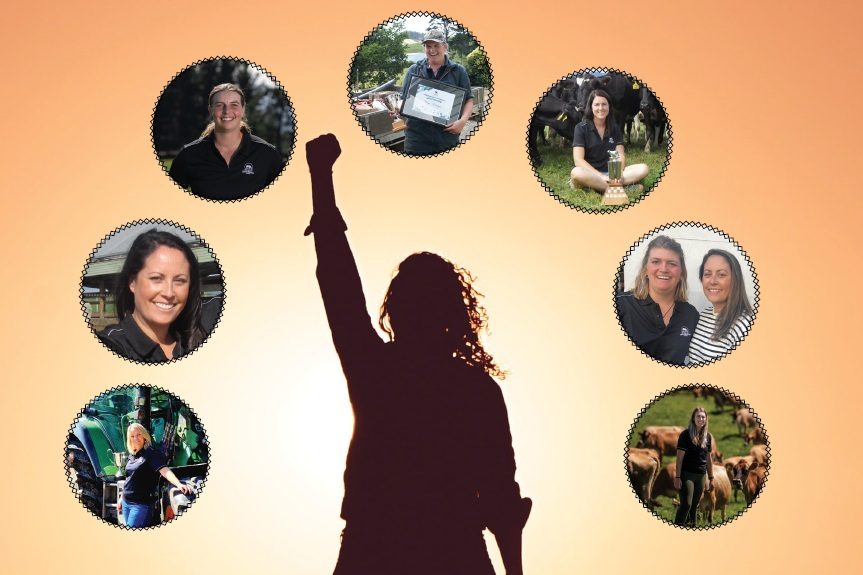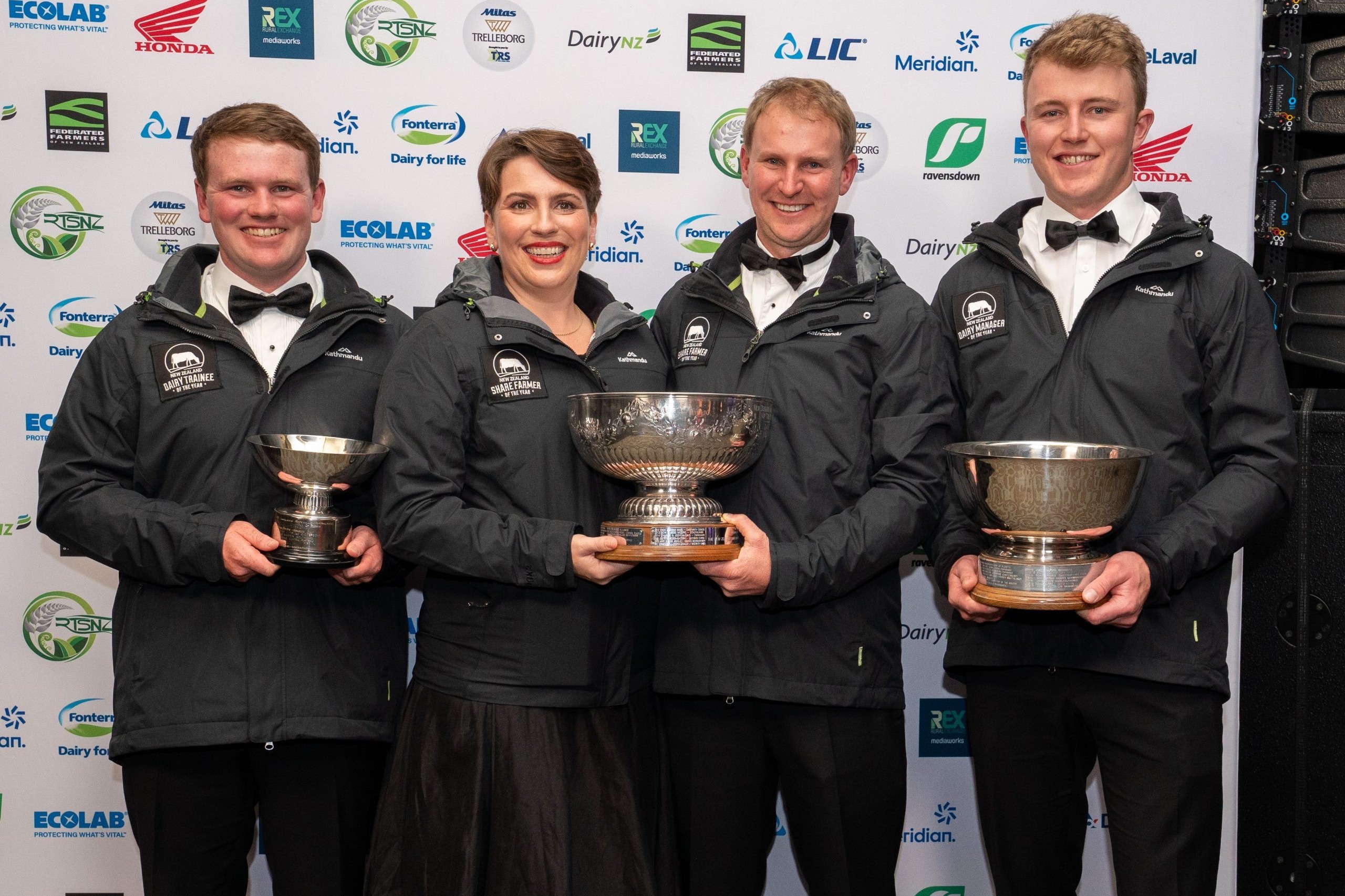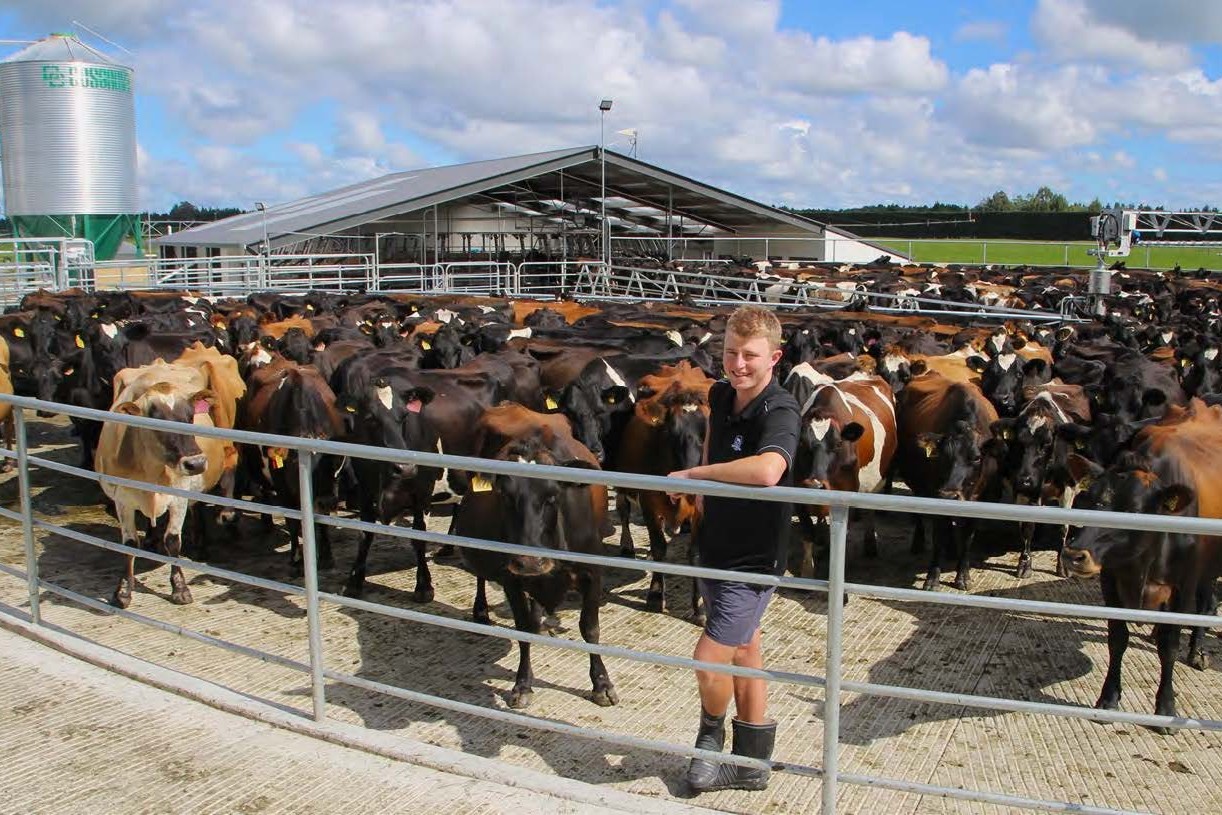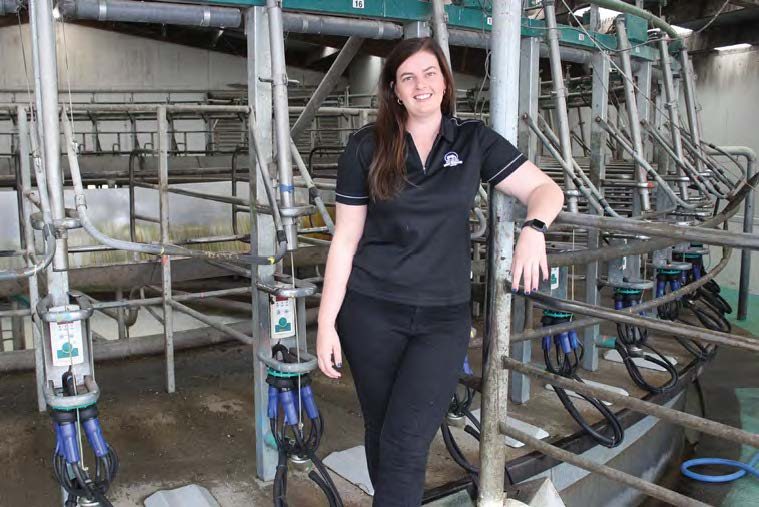Chris Neill
Charlie and Emma Adair, 2020 Northland Share Farmers of the Year, have developed a business progression plan that thrives on synergy. With philosopher Aristotle’s description “the whole is greater than the sum of the two parts” Charlie has the capacity for thinking and acting in the big picture and Emma the ability to manage process and detail.
Both are from England, now New Zealand residents and they have been together since 2010. While their strengths overlap, there is absolute trust and confidence in each other. Having clear, shared vision and goals allows them to focus on what they need to do to achieve success.
Crossing the world in 2015 to start in NZ, Charlie spent their first season as 2IC on a 600-cow farm and Emma relief milked at Rerewhakaaitu. Wanting to manage a farm together, they have found opportunities in Northland that opened to their confidence, focus and drive.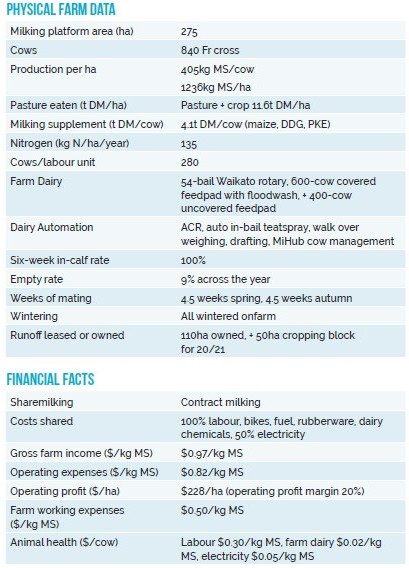
Connecting with people who have encouraged and guided them plus recognising key elements to include in their business strategy has contributed to their rapid progression. This is complemented by the team they rely on to work in their business. The pace is near-frenetic, yet they make time to look after themselves, family and staff.
Charlie and Emma are in their fourth season on this property west of Whangarei and have lifted cow numbers from 640 and production of 254,000kg milksolids (MS) when they stepped on to the property in 2016. With 13.5-week mating, changing to split calving was an easy solution to consolidate calving. Cows were milked through two herringbone sheds – 32 and 20 bail.
The core to their business today is a contract milking job with 840 Friesian cross cows on a 275-hectare platform on a farm owned by Dean and Anne-Maree Adams at Purua. Pasture and crop eaten is at 11.6 tonnes drymatter (DM)/ha (pasture 66% and maize 12% of total diet) and bought in supplement at 4.1t DM/cow (11% palm kernel, 7% maize and 4% DDG of total diet). Annual nitrogen application of 135kg/ha contributes to the 405kg MS/cow or 1236kg MS/ha production. The herd is full time on the platform, split- calved and young stock are raised on a runoff owned by the Adams.
Split calving and the mating policy allow Charlie to claim 100% six-week in-calf rate, accepting that the empty rate is 9%. Mating is 4.5 weeks for both spring and autumn calvers which leads to brief and very busy calving periods with up to 50 calves born a day.
With days in milk a key business driver, he is comfortable for cows to remain in the herd for an extended lactation. Herd testing five times a year creates a steady flow of cows to be dried off while maintaining a minimum of 400 cows being milked.
The attention to detail to make this work is recognised in their LIC Recording and Productivity Award. The judges’ citation states “They showed great record keeping with the use of technology. They have a vision on what they want to achieve from a breeding point of view. Herd records were used well for culling and mating going forward.”
Facilities onfarm are new and have capacity for expansion up to 1000 cows in milk. The new 54-bail Waikato rotary is well appointed with; ACRs, auto teat spray in bail, walk over weighing and auto drafting, Minihub cow management and Smartwash.
These facilities allow one person to milk 320-400 cows an hour and apart from the peak time the shed is operated solo. The upgrade came from an early understanding with Dean that “if they were any good, he would build a new cowshed and if not, he would sell the farm”.
The new shed is a significant contributor to Charlie and Emma winning the Ecolab Farm Dairy Hygiene Award.
The judges noted “The dairy was extremely well presented. Shed cleaning procedures were simple and clear to implement. They are well aware that they are producers of food and the impeccable shed hygiene reflects this.”
Alongside the cowshed is a new 600-cow covered feed pad with flood wash plus an uncovered 400-cow feed pad. In the current drought where pasture is contributing less than 2kg DM/cow/day, it allows for good utilisation of supplementary feed.
Feed management is focused on maintaining average pasture cover at 2200kg DM/ha (drought conditions excepted), with supplement introduced as required to maintain this level of pasture cover. Weekly plating combined with “eyecrometer” are essential to make this system work.
Role definition allows them to maintain focus on this core business while developing their other enterprises. Charlie’s livestock knowledge and Emma’s attention to detail come together for the herd breeding programme.
Matching cows to nominated sires and synchronising heifers requires good judgement and recording. The outcome being steady genetic improvement and well grown replacement heifers primarily from their spring calves.
As the scale and complexity of their business expands, Emma’s attention to safety, compliance, pricing and ordering maintain the stable core to keep it running smoothly. Budgets and cashflows are worked on together with bimonthly reviews.
Emma manages the contract farm herd with a 2IC and farm assistant and casual labour joining the team during busy times. Charlie focuses on cow feeding and breeding, with a 2IC working alongside him in this and other parts of the business.
A mentor assists them specifically with staff management and participation in a recent DairyNZ People Management and Coaching programme keeps them focused on looking after the people engaged in their business.
Staff training and induction comes from Emma or Charlie, depending on which part of the business the training is needed. In awarding them the Honda Health, Farm Safety and Biosecurity Award, the judges’ citation states “They had a great H&S policy in place outlining clear and concise procedures. Staff are an important part of their business and are inducted well with ongoing training provided.”
Equity growth is a key element of the couple’s vision and goals. The citation with their Westpac Business Performance Award reads “Charlie and Emma had very strong financial goals. Their cash flow monitoring was exemplar and they looked beyond the farm gate to generate more income opportunities. They have set themselves some aggressive growth targets and look to be achieving them.”
Their goal of $40m equity at 45 years of age so they can then step back from their business requires considerable capacity for risk. They are ahead of their projected growth targets to achieve this goal with efficiency and profitability in their primary job the cornerstone of the cashflow required to build additional revenue streams and equity.
From a gross farm income at $0.97/kg MS, less operating expenses at $0.82/kg MS there is an operating profit of $228/ha. Farm working expenses are tracking at $0.50/kg MS with the key elements being labour at $0.30/kg MS, electricity at $0.05/kg MS and farm dairy at $0.02/kg MS. Their strong cash flow underpins the stock trading and farm leases.
It sounds like a dream run with everything going their way. In their first year onfarm, Charlie and Emma started buying cows and heifers and raising bull calves. In their second year, having reared 100 bull calves and bought 63 Friesian heifers plus two bulls they were placed under a Notice of Direction for Mycoplasma bovis.
Because they felt it the right thing to do, they voluntarily sent the 65 head to slaughter. All were found to be clear of the disease. With the promise of compensation, they reinvested in dairy heifers and prepared them for export only to be stopped by a second NOD with these animals also going to slaughter, and again found clear of the disease.
While this was happening in 2018, they proceeded with leasing 131ha and stocking it with 400 head of trading cattle and reared 250 calves which were sold at 100kg liveweight. It was also the year their son William was born.
The following season saw the start of a 103ha lease to purchase plus 108ha lease to give them a 130ha platform milking 400 cows and 81 ha for calf rearing and trading. This 2019/20 season will see 1500 head of traded cattle from their combined livestock business. Looking to next season they will add another 167ha of lease land to milk 500 cows. The future offers 50:50 sharemilking for Dean and Anne-Maree but both parties have enough going on at present, so this is on hold.
It’s relatively easy to see this couple achieving their goals of; being in the top 10% of industry leaders, excelling in environmental sustainability, accelerating equity, ensuring employees wellbeing and potential. It’s less easy to see balanced lifestyle but they annually lock in time off farm and away from the business. While Charlie continues without fear and Emma remains highly organised and calm, they will continue to achieve their aspirational goals and excel as Northland industry leaders.
Runner up in Northland Share Farmer of the year were Hamish and Ella Ferguson from Okaihau and José Hamber and Kirby Wilson from Helensville.
Share Farmer merit awards:
DairyNZ Human Resources Award – Hamish and Ella Ferguson
Ecolab Farm Dairy Hygiene Award – Charlie and Emma Adair
Federated Farmers Leadership Award – Jared and Kelsi Dean
Honda Farm Safety, Health and Biosecurity Award – Charlie and Emma Adair
LIC Recording and Productivity Award – Charlie and Emma Adair
Meridian Farm Environment Award – José Hamber and Kirby Wilson
Ravensdown Pasture Performance Award – Hamish and Ella Ferguson
Westpac Business Performance Award – Charlie and Emma Adair


